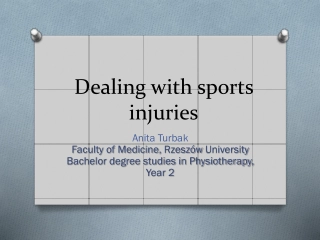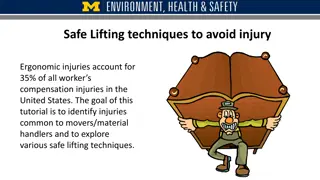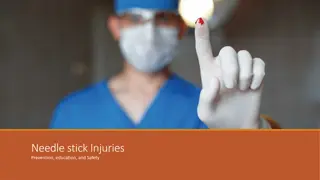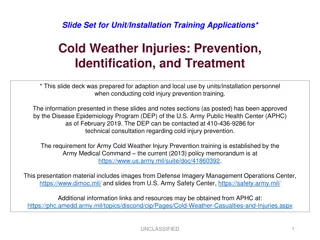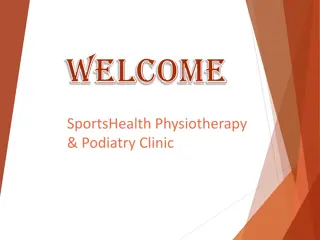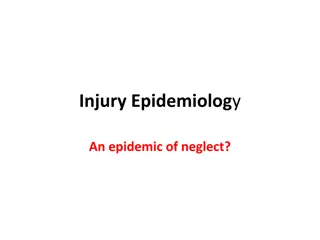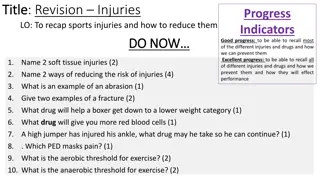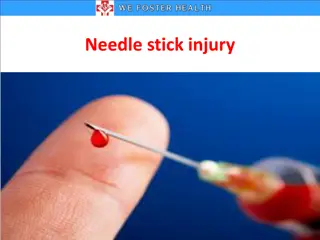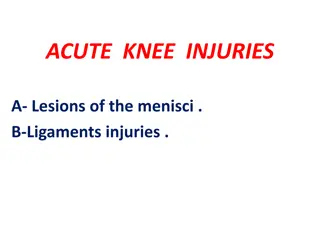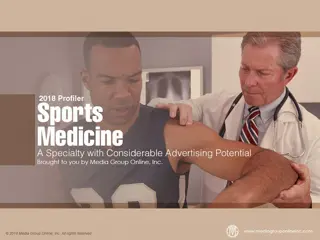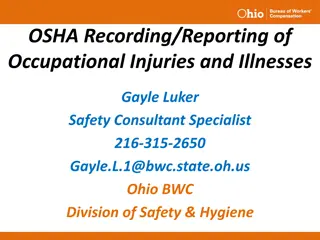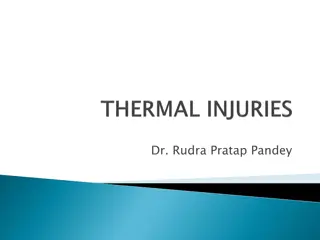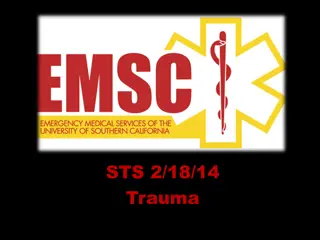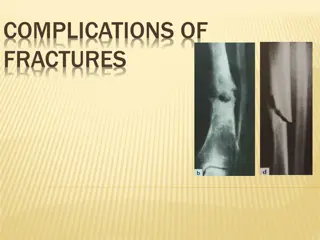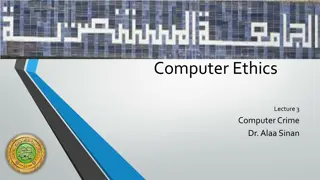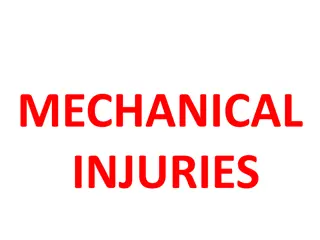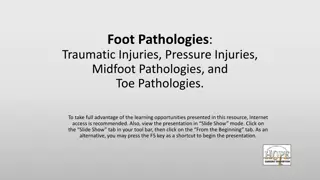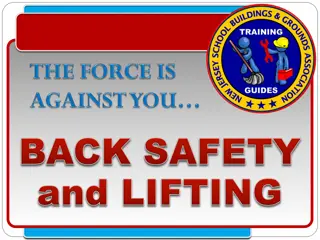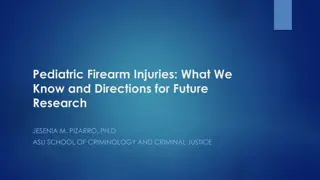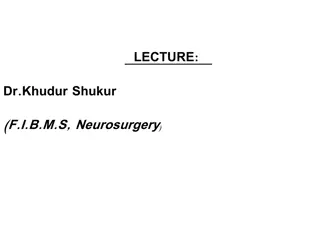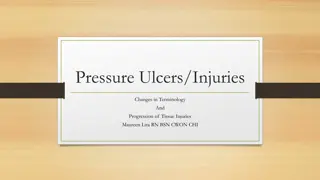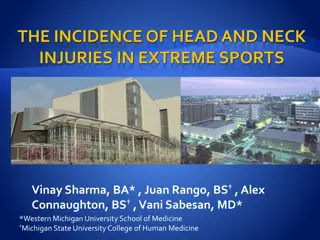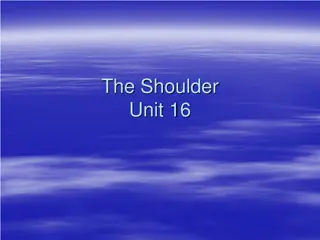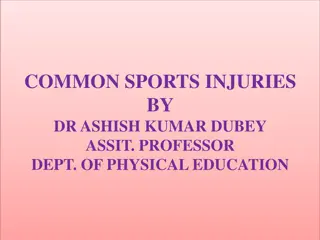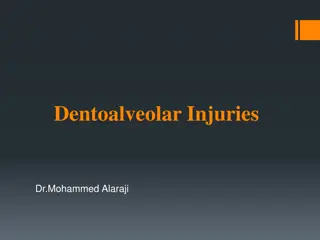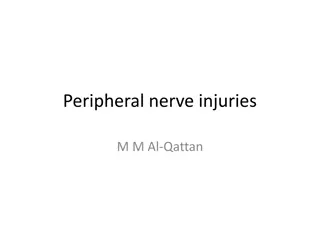Dealing with sports injuries
Anita Turbak, Faculty of Medicine at Rzeszów University, discusses the aims of physiotherapy after sports injury, ways to classify sports injuries, and treatment for soft tissue injuries.
0 views • 15 slides
Spinal injuries
An overview of spinal injuries, including anatomy revision, types of spinal fractures, assessment, management, and common patterns of injuries. It also covers back pain presentation, red flags, differentials, and the structure of vertebrae. The Denis classification of spinal fractures and the most c
3 views • 40 slides
Understanding Computer Organization and Architecture
A computer system is a programmable digital electronics device that processes data as per program instructions to provide meaningful output. It comprises hardware and software components, with hardware being the physical parts and software essential for driving the hardware. Computer organization fo
14 views • 71 slides
PHYSIOTHERAPY IN KNEE JOINT INJURIES
Explore the anatomy of the knee joint, common knee injuries like meniscus tears and ACL ruptures, and the role of physiotherapy in treatment and rehabilitation. Learn about exercises, gait training, and post-surgical care for knee injuries.
2 views • 12 slides
Comprehensive Guide on Injury, Poisoning, and External Causes
This detailed guide covers various aspects of injuries, poisonings, and other consequences from external causes. It includes information on ICD10 and ICD9 coding, recording and treatment details, vocabulary related to different types of injuries, body parts classification, and code structures for di
1 views • 39 slides
Safe Lifting Techniques to Avoid Ergonomic Injuries: A Comprehensive Guide
Ergonomic injuries are a significant concern in the workplace, with musculoskeletal disorders being a common result. This tutorial explores the risks faced by movers/material handlers and provides insights into safe lifting techniques to prevent injuries. Understanding the importance of ergonomics i
6 views • 21 slides
Needlestick Injuries Prevention and Safety
Prevent needlestick injuries by avoiding unnecessary needle use, using devices with safety features, and implementing safe work practices. Healthcare professionals should report injuries promptly, participate in training, and get vaccinated. Be cautious when handling surgical sharps to prevent injur
5 views • 10 slides
Cold Weather Injuries Prevention Training
This slide deck focuses on preventing, identifying, and treating cold weather injuries. It emphasizes the responsibility of both individuals and commands in preventing cold injuries, highlighting factors contributing to susceptibility and methods for regulation body temperature in cold environments.
3 views • 41 slides
If you are searching for Sports Injuries in Collingwood
If you are searching for Sports Injuries in Collingwood, SportsHealth Physiotherapy & Podiatry Clinic is a general physiotherapy and sports injury clinic located in Richmond. Having been operating in the Kew, Abbotsford and Richmond community, we pride ourselves in delivering high quality clinical s
0 views • 6 slides
Uncovering the Neglected Field of Injury Epidemiology
Exploring the realm of injury epidemiology, this content delves into the definitions, objectives, and hypotheses surrounding the study of injuries. It highlights the overlap between injury epidemiology and prevention while shedding light on why this field remains neglected, particularly in Canada. T
0 views • 70 slides
Managing Sports Injuries: Prevention and Treatment Strategies
This content covers various sports injuries, ways to reduce risks, treatment of injuries including R.I.C.E method, and different drugs used in sports like anabolic steroids, beta blockers, peptide hormones, and the concept of blood doping. It also touches upon benefits, risks, and examples related t
0 views • 11 slides
Understanding Needle Stick Injuries and Prevention
Needle stick injuries are percutaneous piercing wounds caused by needles or other sharp instruments. They pose significant risks, including exposure to blood-borne diseases. Health-care workers are particularly vulnerable, with millions experiencing such injuries annually. Proper training, safe prac
0 views • 35 slides
Understanding Computer Architecture and Organization
Computer architecture and organization are fundamental aspects of computing systems. Computer architecture focuses on the functional design and implementation of various computer parts, while computer organization deals with how operational attributes come together to realize the architectural speci
3 views • 40 slides
Computer Science Department Information and Courses Offered
The Computer Science Department provides information on courses offered for GCSE or BTEC qualifications, specifically focusing on the AQA GCSE in Computer Science. The course equips students with valuable thinking and programming skills essential in the modern workplace, covering key concepts and pr
3 views • 7 slides
Understanding Acute Knee Injuries: Meniscal Tears and Ligament Injuries
Acute knee injuries, such as meniscal tears and ligament injuries, are commonly caused by trauma or twisting motions. Meniscal tears can lead to pain, swelling, and locking of the knee joint, especially in young active individuals. Understanding the anatomy of the knee joint and meniscus, along with
0 views • 56 slides
Understanding Vehicle Collisions: Causes, Types, and Injuries
Vehicle collisions involve various types such as front impacts, side impacts, and rear-end collisions, resulting in different injuries like back and head injuries, neck injuries, soft tissue damage, broken bones, and internal injuries. Understanding the causes and effects of collisions can help prev
0 views • 14 slides
Evolution of Algorithms and Computer Science Through History
The history of algorithms and algorithmic thinking dates back to ancient times, with the development of general-purpose computational machines by Charles Babbage in the 19th century marking a significant advancement. The term "computer science" emerged in 1959, encompassing theoretical computer scie
1 views • 39 slides
Manual Handling Toolbox Talk - Importance and Prevention of Injuries
Manual handling injuries are a prevalent issue in workplaces, leading to significant work-related musculoskeletal disorders. Employers must assess and mitigate risks associated with manual handling to ensure employee safety and well-being. Employees also have responsibilities to follow safety protoc
0 views • 16 slides
Sports Medicine: Essential Information for Athletes and Enthusiasts
Sports medicine encompasses various professionals and therapies dedicated to treating and preventing injuries among athletes and physically active individuals. With a market on the rise, the field addresses the vulnerabilities of young athletes, common sports injuries, and the significant role of sp
0 views • 9 slides
Sports-related Injuries and Mechanisms
This content discusses various sports-related injuries and their mechanisms, including shin splints, foot fractures, ankle sprains, and Achilles tendonitis. Each injury is described with its signs and symptoms, along with the mechanisms that caused them. The injuries range from stress fractures in t
1 views • 105 slides
OSHA Recording and Reporting Guidelines by Gayle Luker
Learn about OSHA's guidelines for recording and reporting occupational injuries and illnesses, as shared by safety consultant specialist Gayle Luker in Ohio. Understand the definitions of recordable and reportable events, the independence of OSHA injury recordkeeping and workers' compensation system
0 views • 25 slides
Overview of Burn and Scald Injuries and Classification
Burn injuries from dry heat and scald injuries from hot liquids or steam are common forms of thermal injuries. Other etiological classifications include exposure to chemicals, electrical energy, and radiation. The extent of tissue damage is directly related to temperature and duration. Classificatio
1 views • 31 slides
First Aid Tips for Common Trauma Injuries
Learn how to manage various trauma injuries such as skull fractures, eye injuries, blowout fractures, epistaxis, mouth injuries, soft tissue injuries, open injuries, and penetrating wounds with practical first aid techniques. From treating bleeding and impaled objects to saving dislodged teeth and c
0 views • 16 slides
Preventing Road Traffic Injuries: A Global Perspective
Road traffic injuries are a significant global issue, causing millions of deaths and injuries annually. This report highlights the complexity and dangers of road traffic systems, emphasizing the need for increased awareness and preventive measures at governmental, industrial, and individual levels.
1 views • 27 slides
Complications of Fractures: Types and Risks
Complications of fractures can be classified as general, local early, and late complications. General complications include shock, embolisms, and fever while local complications involve injuries to nearby tissues and infections. Early local complications can lead to visceral, vascular, nerve injurie
0 views • 29 slides
Understanding Computer Crimes and Prevention Strategies
Computer crimes involve illegal acts utilizing computer systems, leading to various consequences. This lecture covers the types of computer system attacks, motives behind computer crimes, costs, prevention strategies, and reflection on the discussed topics. It emphasizes the increasing scope of comp
1 views • 20 slides
Understanding Mechanical Injuries: Types, Classification, and General Principles
Mechanical injuries encompass a variety of harms caused to the body, mind, reputation, or property. These injuries can be classified into medical, legal, and medico-legal categories based on factors like intentionality. The types of mechanical injuries range from blunt force trauma to thermal, chemi
0 views • 79 slides
Management of Closed Head Injuries in an Austere Environment Overview
Understanding the pathophysiology of brain injuries, including intracranial pressure changes and specific injuries such as traumatic brain injury (TBI), skull fractures, brain bleeds, and diffuse axonal injuries. It covers classifications, diagnosis, and treatment approaches for mild/concussion, mod
0 views • 27 slides
Understanding Foot Pathologies: Traumatic Injuries and Pressure Injuries
Explore common foot pathologies including traumatic injuries like plantar fasciitis, turf toe, and sprains, as well as pressure injuries such as plantar ulcers and heel spurs. Learn about the causes, symptoms, and treatment options for these conditions.
0 views • 33 slides
Understanding Back Injuries and Prevention Methods
More than 1 million workers suffer from back injuries each year, accounting for a significant portion of workplace injuries. These injuries are not only painful but can also have long-term effects. It is crucial to learn how to avoid injuring or re-injuring your back to prevent pain and avoid potent
0 views • 32 slides
Understanding Pediatric Firearm Injuries and Future Research Directions
Pediatric firearm injuries are a significant public health concern, with thousands of American children affected annually. Research gaps exist in understanding the causes, consequences, and prevention strategies for pediatric firearm injuries. The lack of surveillance data and research funding hinde
0 views • 16 slides
Understanding Injuries to the Cervical and Thoracolumbar Spine
Cervical spine injuries are common, especially in the 15-30 age group, with motor vehicle accidents, falls, and sports being major causes. Male individuals are more prone to injuries. Neurological deficits are associated with specific types of injuries, necessitating prompt imaging for spinal cord i
0 views • 20 slides
Understanding Pressure Ulcers and Tissue Injuries Progression
Pressure ulcers, also known as pressure injuries, are localized damages to the skin and underlying soft tissue usually over bony prominences. The National Pressure Ulcer Advisory Panel changed the terminology in 2016 to classify all stages as injuries, not just ulcers. Stages range from non-blanchab
0 views • 13 slides
The Incidence of Head and Neck Injuries in Extreme Sports
Study on the prevalence of head and neck injuries in extreme sports, specifically focusing on concussions, a common type of brain injury. The research highlights the impact and risks associated with extreme sports activities, showcasing data on traumatic brain injuries and non-fatal incidents relate
0 views • 25 slides
Understanding Birth Injuries in Newborns
Birth injuries in newborns can result from various factors during the birthing process, such as soft tissue injuries and head trauma. Soft tissue injuries like facial abrasions and scleral hemorrhage may occur due to causes like dystocia and forceps delivery. Nursing care involves assessing and reas
0 views • 19 slides
Understanding Upper Extremity Injuries and Shoulder Physiology
Upper extremities are prone to various injuries in sports, including sprains, strains, dislocations, fractures, and repetitive motion injuries like arthritis and tendonitis. The shoulder complex involves bones, muscles, tendons, ligaments, and articulations. Joints like the sternoclavicular, acromio
0 views • 63 slides
Understanding Common Sports Injuries by Dr. Ashish Kumar Dubey
Dr. Ashish Kumar Dubey, Assistant Professor in the Department of Physical Education, categorizes common sports injuries into soft tissue injuries, bone injuries, and joint injuries. Soft tissue injuries include sprains, strains, contusions, abrasions, lacerations, and incisions. Sprains are ligament
0 views • 7 slides
Understanding Dentoalveolar Injuries: Causes and Classification
Dentoalveolar injuries refer to trauma affecting the teeth and their supporting structures. These injuries can range from isolated incidents to significant maxillofacial damage. They are classified into categories based on the affected tissues, including hard dental tissues, pulp, periodontal tissue
1 views • 18 slides
Analysis of School Bus Crash Statistics in Ohio
Explore the statistics and findings from crashes involving school buses in Ohio, including comparisons with teen driver crashes, crash information, driver and occupant injuries, and definitions of injuries. Sergeant Trevor Jasper, as the Crash Reconstruction Supervisor from the Ohio State Highway Pa
0 views • 10 slides
Overview of Peripheral Nerve Injuries and Brachial Plexus Injuries
Explore different types of peripheral nerve injuries including Erb's palsy, Klumpke palsy, isolated axillary nerve injury, and isolated musculocutaneous nerve injury. Learn about the anatomy, causes, motor and sensory exams, and management of these injuries. Understand the myotomes and dermatomes as
0 views • 19 slides
